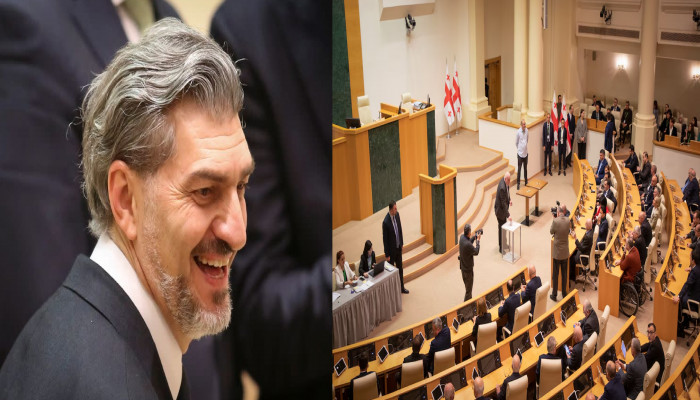Georgia’s lawmakers elect hardline West critic, former soccer player as new president
- In Reports
- 07:35 PM, Dec 14, 2024
- Myind Staff
On Saturday, Georgian lawmakers elected Mikheil Kavelashvili, a strong critic of the West, as president. He is set to replace the current pro-Western president. This election comes after major protests in the country, triggered by the government’s decision to pause Georgia’s European Union membership talks last month.
The ruling Georgian Dream party’s decision to delay the EU accession process until 2028 has angered many people in Georgia. This move halts a long-term goal that is enshrined in the country's constitution, even though most Georgians support joining the EU, according to opinion polls. Kavelashvili, a former professional soccer player, holds strong anti-Western views and often shares conspiracy theories. In his speeches this year, he claimed that Western intelligence agencies are trying to push Georgia into war with Russia, which controlled Georgia for 200 years until 1991.
Ahead of the presidential vote, hundreds of protesters gathered outside parliament in light snowfall. Some of them played soccer in the street and waved red cards at the parliament building, making fun of Kavelashvili’s soccer career. Vezi Kokhodze, a protester, called the vote "treason" against Georgians' aspirations to join the West. "Today's election represents the clear wish of the system to bring Georgia back to its Soviet roots," he said.
In Georgia, the president is chosen by a group of electors made up of MPs and local government representatives. Out of 225 electors, 224 voted for Kavelashvili, who was the only candidate nominated. All opposition parties have boycotted parliament since the October elections. The official results showed that the ruling party, Georgian Dream, won nearly 54% of the vote, but the opposition claims the elections were rigged.
Kavelashvili, nominated for the mostly ceremonial presidency last month, was put forward by Bidzina Ivanishvili, the influential billionaire ex-prime minister. Ivanishvili has been working to strengthen ties with Russia, a country that many Georgians oppose. Kavelashvili leads People’s Power, an anti-Western faction of the ruling party. He also helped create a law that forces organisations receiving over 20% of their funding from abroad to register as foreign agents, with severe penalties for non-compliance. Salome Zourabichvili, the outgoing president and a pro-EU opponent of the ruling Georgian Dream party, has declared her intention to stay in office when her term is over and has positioned herself as a leader of the protest movement. Because of the suspected election fraud in October, she views parliament as illegitimate. Zourabichvili said that the choice of her successor was "a mockery of democracy" in a post on X just before the vote.
Opposition parties in Georgia have said they will continue to recognise Zourabichvili as the legitimate president, even after Kavelashvili is sworn in on December 29. After the vote, Prime Minister Irakli Kobakhidze congratulated Kavelashvili and called the outgoing president an "agent" of unnamed foreign powers. For many years, Georgia was seen as one of the most pro-Western and democratic countries among the former Soviet states. However, this year, relations with the West have become strained. The ruling party, Georgian Dream, passed controversial laws on foreign agents and LGBT rights, which critics say are influenced by Russia. Western countries have expressed concern over Georgia's shift in foreign policy and its move toward more authoritarian measures, with the EU threatening sanctions due to the crackdown on protests, which has led to hundreds of arrests.
Since the start of the war in Ukraine, Georgian Dream has worked to improve ties with Russia, which supports two breakaway regions in Georgia and defeated Georgia in a short war in 2008. Tens of thousands of people have protested outside parliament every night for more than two weeks. Some protesters have thrown fireworks at police, who have used water cannons and tear gas to disperse them. The government claims that the protests are an attempt to carry out a pro-EU revolution and take power by force. Georgia's interior ministry has reported that over 150 officers have been injured during the protests.







Comments